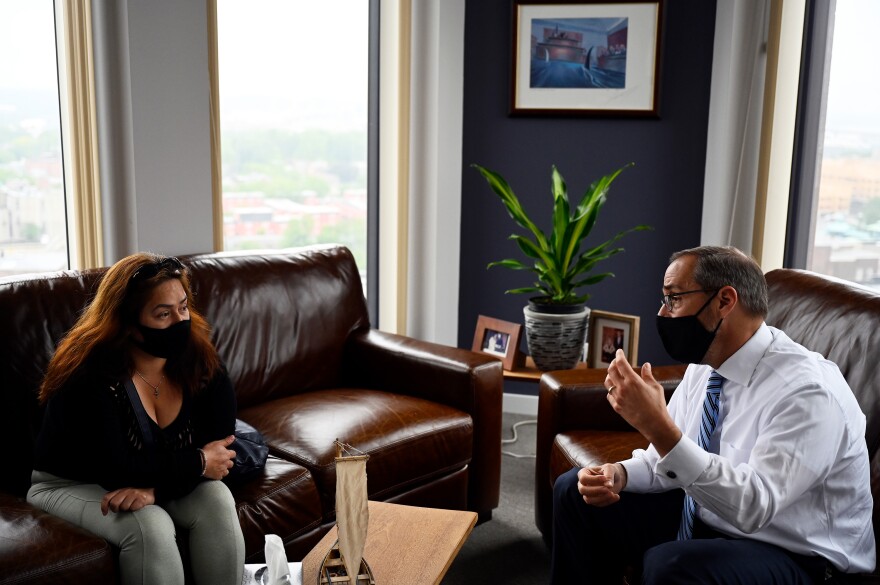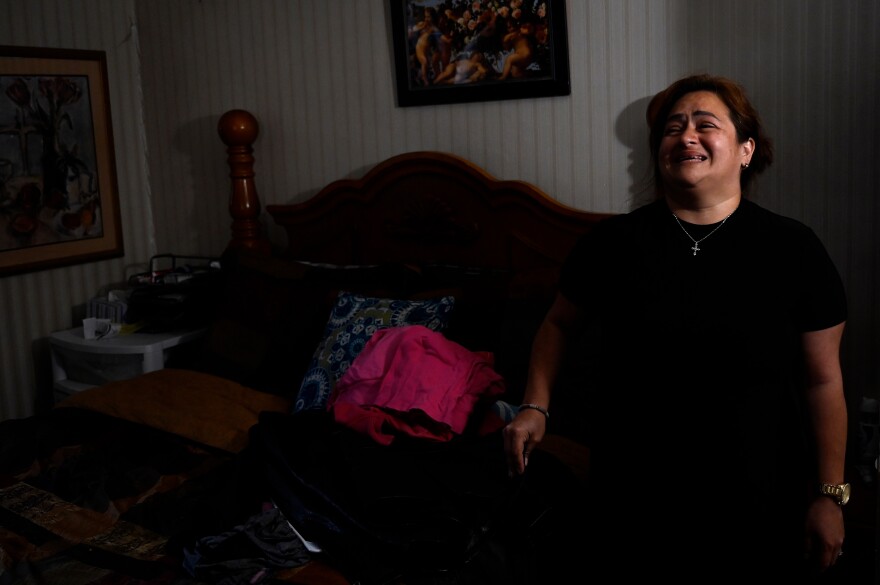Glenda Cardenas is worried about her kids. Seated in their living room in Waterbury, she said her son and daughter, 10 and 14 years old, are afraid she’ll leave them. Again.
Speaking in Spanish, Cardenas said the children ask if they’ll be separated next April. Right now, that’s as late as Cardenas can legally stay in the U.S. She said the kids cry and anxiously count the months. They want to know what will happen to them. And though she’s not sure it’s true, she’s promised that she won’t leave them next year and that they won’t be separated.
Cardenas is from San Pedro Sula, one of the most violent cities in Honduras, a country with one of the highest murder rates in the world. In 2005, when she was 24, she crossed the U.S. border undocumented and met and married Miguel Torres, a U.S. citizen from Puerto Rico. They moved to Waterbury with their two children. Cardenas was able to get a work permit and Social Security card.

But things changed in early 2016, when she was told she’d have to start reporting to Immigration and Customs Enforcement. She complied with the ICE orders. She has no criminal record. Still, in 2018, Cardenas was deported to Honduras. Torres, a busy salesman, became a single parent caring for two children profoundly affected by the loss of their mother.
“I remember one time meeting him because we had to talk about Glenda’s case,” said her immigration attorney, Glenn Formica. “I walked him out to the car and in the back his two kids were working on a plywood table that he had made for the back seat doing their homework. And it was probably 9, 9:30 at night.”
After an accident at home earlier this year, Torres was hospitalized, gravely ill. Formica contacted the Department of Homeland Security. He wanted Cardenas to be able to see her husband before he died.

“Glenda received, because of really and I mean extremely dire personal circumstances, a very limited form of relief called ‘humanitarian parole,’” he said. “It’s rare. I mean, it’s unicorn rare.”
Most deportees are barred from returning to the U.S. for 10 years, but Cardenas was allowed back temporarily.
“It was actually a new attorney in Homeland Security who was an empathetic person who got back to me on a Sunday night,” Formica said. “And it was because of her efforts that Glenda was able to fast-track a visa in Honduras.”
Not long after Cardenas returned to Connecticut, Miguel Torres died. Now Cardenas has become a single parent. But her permission to stay runs out in the spring, and her children fear she’ll be deported again.
Formica said they’ve applied for a special immigration petition that would allow her to stay, but the legal process is not quick or easy.
“It’s a thicket of statutes and regulations to try to put together what we would call legal status,” he said.
Cardenas’ case is crawling through an overburdened legal system during a period when — despite an ongoing crisis at the U.S.-Mexico border — unofficial figures show overall arrests, detentions and deportations nationwide at near-record lows. That’s due in part to the pandemic. At the same time, new Biden administration guidelines on immigration enforcement have just taken effect. The rules spell out whom ICE should prioritize, narrowing the focus to those who could be a real threat to national security or public safety.

Randy Capps, director of research for U.S. programs at the Migration Policy Institute, said the new guidance encourages a change in culture at ICE, requiring officers to shift the way they view the nation’s estimated 11 million undocumented immigrants.
That culture change is about saying that “officers need to start viewing the people that they are in charge of dealing with not just first and foremost — or only — as lawbreakers, but also as human beings,” Capps said. “To start understanding that they’re parents, that they may be caregivers of older people, they may be homeowners, that they may have strong ties to the community.”
ICE has not responded to CT Public Radio’s request for comment.
The new guidance has faced pushback from congressional Republicans. In a letter this month, 45 House members charged DHS with seeking to “in effect, abolish ICE from within.” And attorneys general from Arizona, Ohio and Montana have sued the president and DHS over the new policy. They allege that it “abandons DHS’s duties to enforce or implement entire swaths of immigration law.”
But Capps said various presidential administrations have had different policies about whom they target for arrest, detention and deportation. That’s based in large part on the kinds of public safety threats they represent, Capps said. Under the new guidelines, ICE officers are being given more discretion to look at migrants as whole people with multidimensional lives, he said. And he hopes the new rules will also increase transparency.

“We have seen improvements in transparency at ICE over the years. Hopefully this memo will push that further. Because with an apparatus that’s that large and powerful and has so much impact on people’s lives, it’s really important for it to be transparent, for the public to know what’s going on,” he said.
Meanwhile, Glenda Cardenas said it’s overwhelming not knowing whether she’ll be deported again. She broke down at the thought that she might have to leave her children for a second time and said that with the limited opportunities for young people in Honduras, it’s just not a good place for them.
Moreover, she said, her kids are not from that country. They were born in the U.S. Their father is from the U.S. And though her blood may run through their veins, she said, to her children, Honduras would be a foreign land.











